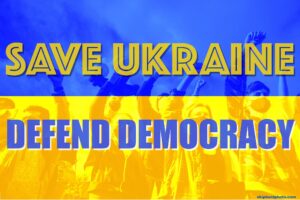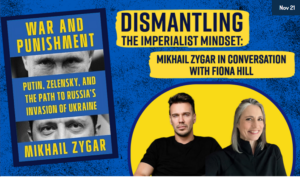The Ukraine war is only the first phase of a broader conflict between Western democracies and an emerging axis comprising Russia and its allies, according to VoxUkraine’s Ilona Sologoub and Yuriy Gorodnichenko, Professor of Economics at the University of California, Berkeley. And while the West enjoys economic, military, and technological superiority, it is in growing danger of squandering its advantages and paying a much higher price later.
While Russia and its allies may appear intimidating, they are economically, militarily, and technologically weaker than the world’s liberal democracies, they write for Project Syndicate:
But Western countries must not squander their significant advantage. Political infighting in the West empowers Russia and its allies and enables them to provoke more conflicts, further straining Western democracies’ military, financial, and emotional resources. Russian revanchism can and must be defeated in Ukraine.
America prides itself as the world’s arsenal of democracy, The Economist adds. Now the great arsenal is drying up because of political paralysis.
The U.S. should make certain Russia, China, Iran and North Korea know that when beleaguered democracies need our assistance they will get it, argues Mark Montgomery, a senior fellow at the Foundation for Defense of Democracies. Statements of intent must be enacted, and critical support to countries like Ukraine cannot be rationed or cut off.
Democracies must not only speak but also act decisively and boldly, said Belarusian democracy movement leader Sviatlana Tsikhanouskaya. Ukraine and Belarus both merit sustained support for their continuing pursuit of freedom, she said, speaking after the National Endowment for Democracy’s Lipset lecture, delivered by Stanford’s Larry Diamond.
 Putin’s “promises about the stability of Russia’s government were always just promises,” renowned journalist Yevgenia Albats told a Connecticut College forum. “It didn’t happen overnight,” she said, describing Putin’s responsibility for the deinstitutionalization of democracy in the Russian Federation.
Putin’s “promises about the stability of Russia’s government were always just promises,” renowned journalist Yevgenia Albats told a Connecticut College forum. “It didn’t happen overnight,” she said, describing Putin’s responsibility for the deinstitutionalization of democracy in the Russian Federation.
Reports of Ukraine’s counteroffensive as unsuccessful are unjustified, adds RAZOM. To date, Ukraine has successfully liberated over 50% of Russian-occupied territory, thanks to the unwavering support from the United States. However, the stopping that aid would put Ukraine’s ability to safeguard its freedom against Putin’s aggression in extreme jeopardy!
A new paper from The Economic Policy Advisory Council – a group of Ukrainian and international economists acting as an advisory body under the Ministry of Economy -proposes a broad “financing democracy” deal between Ukraine and its partners. Kyiv should commit to key outcomes on democracy, defense and fiscal self-reliance when the war and reconstruction are over in return for sustained support until then, according to Financing Democracy: Why and How Partners Should Support Ukraine.
 Supporting Ukraine is not charity, since the existential war for its own survival is also a war to defend the international rule of law, European democracy and security, the authors assert, stressing two critical reasons why democracies should support Ukraine’s defense and reconstruction:
Supporting Ukraine is not charity, since the existential war for its own survival is also a war to defend the international rule of law, European democracy and security, the authors assert, stressing two critical reasons why democracies should support Ukraine’s defense and reconstruction:
- First, values. Ukraine is a liberal democracy, which aims to embed these values – respect for human rights and freedom in a democratic society governed by the rule of law – in its institutions, in particular by becoming a member of the European Union. If Russia is not defeated, Putin and other autocrats and dictators will be emboldened, and the global threat to democracy – in retreat for the last 18 years according to Freedom House – is likely to intensify.
- Second, security. Russia under Putin poses the main security threat to Europe, with a revisionist doctrine justifying aggression, a proven willingness to subvert and attack its neighbors and no respect for the norms of diplomacy or war. Ukraine is holding this threat at bay and has materially weakened Russia’s capabilities, at the modest cost of 3% of total NATO defense expenditure. But the risk remains acute…. RTWT
Putin is “waiting for the United States to quit on its Ukrainian partners so he can launch a new offensive to seize more of Ukraine and destroy its democracy,” says Michael McFaul, the director of Stanford University’s Freeman Spogli Institute for International Studies. “Without U.S. assistance, more Ukrainians will certainly die, and Ukraine may well lose more territory,” he warned recently in Foreign Policy.
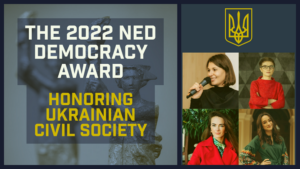 “Ordinary people doing extraordinary things,” Ukraine’s civil society remains resilient, said Anna Bondarenko, head of NED’s 2022 Democracy Award honoree Ukrainian Volunteer Service, in remarks during a special tribute to Ukraine during NED’s 2023 Democracy Awards (below).
“Ordinary people doing extraordinary things,” Ukraine’s civil society remains resilient, said Anna Bondarenko, head of NED’s 2022 Democracy Award honoree Ukrainian Volunteer Service, in remarks during a special tribute to Ukraine during NED’s 2023 Democracy Awards (below).
Enamored of Kyiv’s early successes and high morale, Ukraine’s supporters became accustomed to stunning Ukrainian triumphs, note analysts Liana Fix and Michael Kimmage, author of the forthcoming Collisions: The Origins of the War in Ukraine and the New Global Instability. Yet this David-versus-Goliath framing of the war now generates too much pessimism when Ukrainian forces struggle or come to a deadlock with Russian troops.
With the West’s help, Ukraine has deterred its much more powerful neighbor. Over a year into the war, Russia has been unable to take Kyiv or any major Ukrainian city besides Mariupol. Despite its vast economic and military resources, Russia has not been truly on the offensive since the early summer of 2022, they write in A Containment Strategy for Ukraine: How the West Can Help Kyiv Endure a Long War, an article for Foreign Affairs:
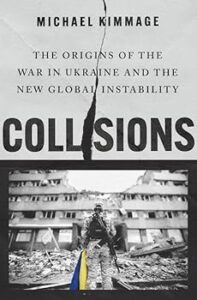 Containing Russia should be conceptualized—and celebrated—as a steady continuum of action that started before February 2022 and came into its own with the Ukrainian defense of Kyiv and battlefield advances in the fall of 2022. Containment, by definition, can deliver only a partial victory, and for this reason, ups and downs in public sentiment in countries allied with Ukraine are to be expected. These ups and downs make it all the more worthwhile for Western leaders, who are sensitive to surges of optimism and disappointment, to adopt containment as their unchanging compass. Doing so will help both Ukraine’s war efforts and morale in Ukraine’s allies.
Containing Russia should be conceptualized—and celebrated—as a steady continuum of action that started before February 2022 and came into its own with the Ukrainian defense of Kyiv and battlefield advances in the fall of 2022. Containment, by definition, can deliver only a partial victory, and for this reason, ups and downs in public sentiment in countries allied with Ukraine are to be expected. These ups and downs make it all the more worthwhile for Western leaders, who are sensitive to surges of optimism and disappointment, to adopt containment as their unchanging compass. Doing so will help both Ukraine’s war efforts and morale in Ukraine’s allies.
Certain arm-chair pundits have wanted to sell out Ukraine even before last February, according to David J. Kramer, John Herbst, and William Taylor. In Foreign Affairs, Richard Haass and Charles Kupchan repeated their previous calls for Ukraine to make concessions and strike a deal with Russia to end the war. They, along with Thomas Graham, have engaged in “secret” talks with Russian officials without Ukrainians involved for months, even well before Ukraine’s counteroffensive, they write for The Bulwark:
In their latest misfire, Haass and Kupchan fail to understand that an aggressive Kremlin has its sights set on not just Ukraine but other countries in the region. If not stopped in Ukraine, Moldova or NATO member states might be next. ….Since Russia’s initial invasion of Ukraine in 2014, Ukraine’s military has become a formidable force, as Jonathan Tepperman notes in the Catalyst.
To challenge Russia on its ongoing aggression against Ukraine and to secure the integrity of its own political, ideological and economic project, the West can no longer remain within the boundaries of conventional thinking and needs to enter uncharted territory too, argues Anton Shekhovtsov, director of the Vienna-based Centre for Democratic Integrity and author of New Radical Rightwing Parties in European Democracies (2011), Russia and the Western Far-Right: Tango Noir (2017), and Russian Political Warfare.
In practical terms, this demands devising daring and audaciously unorthodox solutions, teetering on the edge of brazenness, to confront the Russian threat in a ground-breaking and inventive manner, he writes for EU Observer, endorsing proposed solutions recently voiced by former Nato secretary general Anders Fogh Rasmussen.
 As Russia continues to wage its war of aggression, leaders in Kyiv view security guarantees from the United States and Europe as the only path to an enduring peace, notes Kateryna Bondar (right), a former adviser to Ukraine’s ministries of defense and finance. But here, there is no easy solution, she writes for the Carnegie Endowment.
As Russia continues to wage its war of aggression, leaders in Kyiv view security guarantees from the United States and Europe as the only path to an enduring peace, notes Kateryna Bondar (right), a former adviser to Ukraine’s ministries of defense and finance. But here, there is no easy solution, she writes for the Carnegie Endowment.
Ukraine joining NATO is an unlikely option until the war ends, something President Volodymyr Zelensky has acknowledged. EU membership, which comes with a weaker security guarantee, is still years away. Meanwhile, Russia appears to be preparing for a long war of attrition. Ukraine’s fighting spirit remains high, but its economic and human resources are heavily strained, adds Bondar, a Penn Kemble Fellow at the National Endowment for Democracy (NED):
Strategically investing in joint ventures based in Europe, under EU law and NATO’s protection, can help pave the way for increased production of needed weapons systems, foster collaboration between Ukrainian and Western firms and professional managers, and ease the overall aid burden borne by the U.S. and European governments. This bridging solution can bring tangible benefits to Ukraine and NATO, and gradually integrate the country into the Euro-Atlantic security architecture as it moves toward formal membership in Western institutions.
 A report by the German Council on Foreign Relations predicts Russia will be ready to attack NATO within six to ten years after a possible Ukrainian defeat, adds Elena Davlikanova, co-author of ‘The Work of the Ukrainian Parliament in Wartime’ and ‘The War of Narratives: The Image of Ukraine in Media.’ Meanwhile, Russian society — as noted by Oleksii Danilov, Secretary of Ukraine’s National Security and Defence Council, is ossified. Putin’s death is not enough to bring about any changes in Russia.
A report by the German Council on Foreign Relations predicts Russia will be ready to attack NATO within six to ten years after a possible Ukrainian defeat, adds Elena Davlikanova, co-author of ‘The Work of the Ukrainian Parliament in Wartime’ and ‘The War of Narratives: The Image of Ukraine in Media.’ Meanwhile, Russian society — as noted by Oleksii Danilov, Secretary of Ukraine’s National Security and Defence Council, is ossified. Putin’s death is not enough to bring about any changes in Russia.
Ukrainians, who went through three revolutions on their 30-year path to democracy, know very well what it takes to build and protect a democratic system. The need for changes in mentality, institutional reform, and human courage is massive, she writes for the Center for European Policy Analysis:
As a Ukrainian who prefers to have civilized and peace-loving neighbors, I wish the dreams of the new Russian dissidents would come true. But as a Ukrainian who has experience in democracy development, I fear the majority will grow old in exile dreaming of a Motherland that never wanted them in the first place.
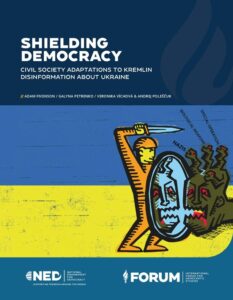 While the West’s support of Ukraine has led to significant advances against Russia, the strategy is reaching its limits. At the current trajectory, “the choice facing the West is not between war and compromise but between defeat and victory,” Nona Mikhelidze argues in Foreign Policy. Time and resources are of the essence in a conflict that not only becomes more polarized but could also seal Ukraine’s future.
While the West’s support of Ukraine has led to significant advances against Russia, the strategy is reaching its limits. At the current trajectory, “the choice facing the West is not between war and compromise but between defeat and victory,” Nona Mikhelidze argues in Foreign Policy. Time and resources are of the essence in a conflict that not only becomes more polarized but could also seal Ukraine’s future.
A project documenting the art and lives of the dozens of Ukrainian cultural workers who have been killed in Russia’s war against Ukraine has been launched by PEN Ukraine and The Ukrainians, say reports:
Called “People of Culture Taken Away By The War” the online project – funded by the National Endowment for Democracy (NED) – consists of a series of written portraits that delve into the art created by these fallen heroes, while engaging with their families and colleagues to craft narratives honoring their memory. The initiative seeks to preserve the legacy of those lost to Ukrainian culture due to the war and stands as evidence of Russia’s intent to commit genocide against Ukrainians.
A bridging solution [of joint ventures] can gradually integrate #Ukraine into the Euro-Atlantic security architecture as it moves toward formal membership in Western institutions, @NEDemocracy #PennKemble Fellow #KaterynaBondar writes for @CarnegieEndow. https://t.co/IEDESbvN20
— Democracy Digest (@demdigest) December 5, 2023

